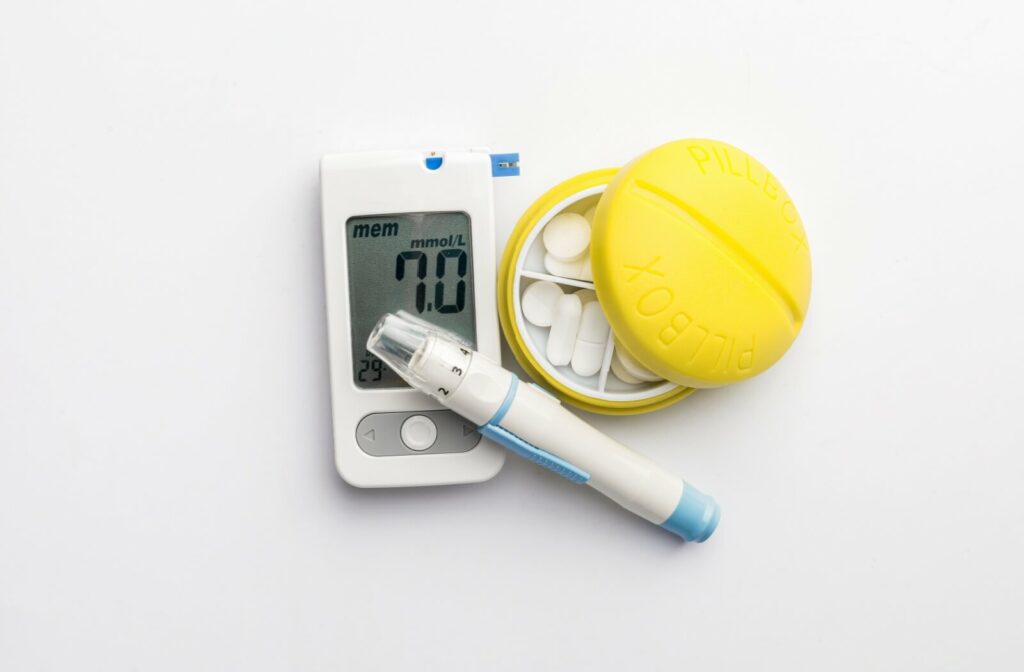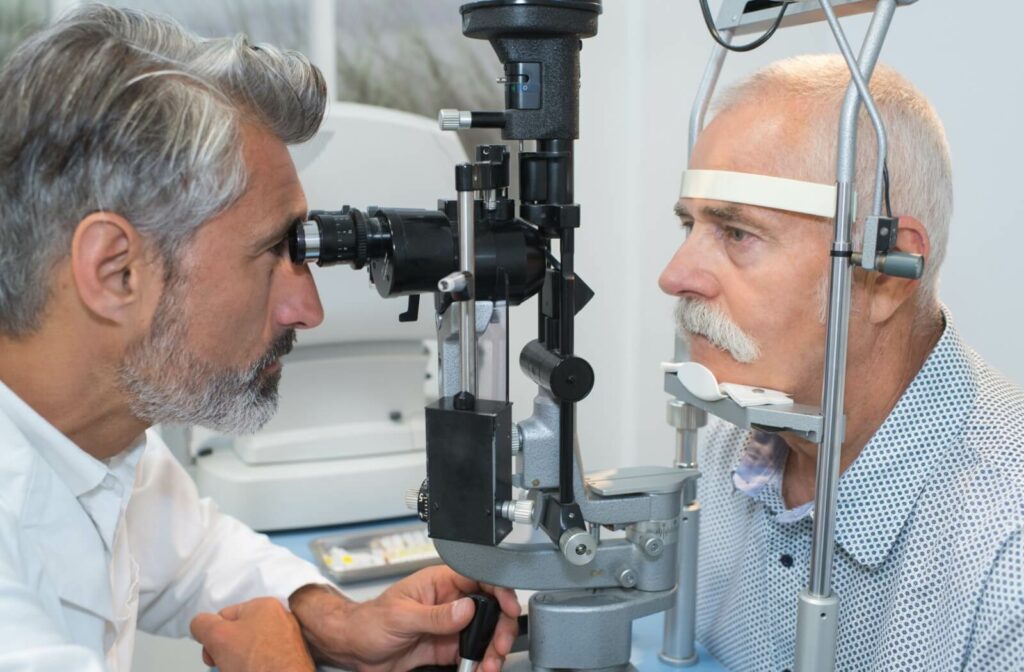When we think about eye exams, we often picture reading letters on a chart or getting a new prescription for eyeglasses. But there’s far more to an eye exam than meets the eye. Did you know a comprehensive eye exam can uncover signs of major health conditions, such as diabetes?
At Cherry Creek Eye Physicians & Surgeons, we believe that your vision health is closely linked to your overall well-being. Understanding the connection between diabetes and eye health can empower you to take proactive steps toward preserving your vision and managing your health.
How Eye Exams Help Detect Diabetes
Your eyes provide a unique window into your health. A comprehensive eye exam, particularly one where your eyes are dilated for a closer look, can reveal early signs of diabetes, sometimes before you notice symptoms elsewhere in your body.
Diabetes affects the blood vessels throughout the body, including those in your retina, the light-sensitive tissue at the back of your eye. During a dilated exam, eye doctors examine your retina to look for changes in these vessels. Early indicators of diabetes may include leaking blood vessels, swelling, or even tiny retinal hemorrhages.
While an eye exam alone can’t officially diagnose diabetes, it can serve as a powerful early warning sign and prompt a referral to your primary care physician. In fact, eye doctors are often among the first healthcare professionals to detect signs of this systemic disease.
The Connection Between Diabetes & Eye Health
Diabetes can silently affect your vision, and the damage it causes isn’t always reversible. The most common diabetes-related eye condition is diabetic retinopathy, which occurs when elevated blood sugar damages the small blood vessels in your retina.
Without proper care, this condition can lead to serious complications, including vision loss or even blindness. Symptoms of diabetic retinopathy may include:
- Blurry or fluctuating vision
- Difficulty seeing colors
- Dark or empty areas in your field of vision
- Persistent eye floaters
- Sudden vision loss in more advanced stages
Another potential complication is diabetic macular edema, which happens when fluid leaks into the macula (the part of the retina responsible for your central vision). Both conditions can progress without noticeable symptoms in the early stages, making regular eye exams essential for early detection and treatment.
How Often Should You Schedule Eye Exams?
Routine eye exams are an essential part of overall health care, particularly for those with diabetes. The American Diabetes Association recommends:
- Type 2 diabetes: Schedule a comprehensive dilated eye exam at the time of diagnosis.
- Type 1 diabetes: Have your first eye exam within 5 years of diagnosis.
- Annual exams: After your first screening, plan for yearly eye exams, or more frequently if advised by your doctor.
For individuals without diabetes, annual eye exams are still important, especially if you have risk factors like high blood pressure, high cholesterol, or a family history of eye disease.

How Diabetes Medications Can Affect Your Vision
Managing diabetes with medications is a key part of maintaining overall health, but it’s important to understand how some of these treatments may temporarily affect your eyes.
When blood sugar levels are brought down quickly through insulin, oral medications, or injectable therapies, it can sometimes result in temporary vision changes or even influence existing eye conditions.
Insulin & Rapid Blood Sugar Control
Insulin is a powerful tool in managing diabetes, especially for individuals with significantly elevated blood sugar. However, when glucose levels drop too quickly, it can lead to blurred vision or changes in the shape of the eye’s lens. These shifts are usually short-term but can be disorienting at first. For people with diabetic retinopathy, rapid improvement in blood sugar levels may temporarily worsen retinal damage before stabilizing.
Hypoglycemia-Related Vision Issues
Some oral medications, particularly sulfonylureas, can cause episodes of low blood sugar (hypoglycemia). When this happens, people may experience sudden changes in vision, such as blurriness or difficulty focusing. These effects typically resolve once blood sugar levels return to normal, but repeated lows can be problematic if left unaddressed.
Ozempic & Retinopathy Risks
GLP-1 receptor agonists like Ozempic have shown excellent results in lowering blood sugar and supporting weight loss. However, some research suggests they may be associated with a temporary worsening of diabetic retinopathy, especially if blood sugar improves too rapidly in people with existing eye disease. This makes regular eye exams especially important when starting or adjusting these medications.
Eye Exams Go Beyond Your Vision
While detecting diabetic eye disease is a major benefit of regular eye exams, your eyes can also provide clues to other serious health conditions. At Cherry Creek Eye Physicians & Surgeons, our thorough exams can uncover signs of:
- High cholesterol, visible as deposits in your cornea
- Hypertension, through changes in the blood vessels of the retina
- Autoimmune conditions like lupus or rheumatoid arthritis, which may cause inflammation in or around the eyes
- Certain cancers, such as ocular melanoma or lymphoma, can present subtle signs during an eye exam
Your eye exam is more than just a check-up for glasses, it’s a window into your overall health.
Preserve Your Visual Health
Diabetes-related eye damage often develops without warning, catching many people off guard. At Cherry Creek Eye Physicians & Surgeons, we can help through early detection, education, and personalized care to preserve your vision.
Don’t wait for symptoms to appear. Whether you’ve been managing diabetes for years or are newly diagnosed, a comprehensive eye exam is an essential step in your health journey. Schedule your visit to Cherry Creek Eye Physicians & Surgeons today, and take control of your vision and your health.


